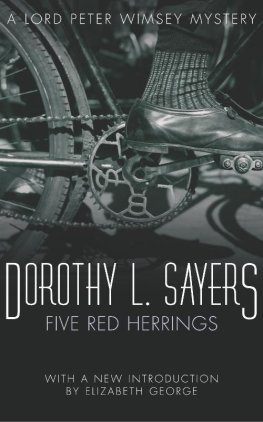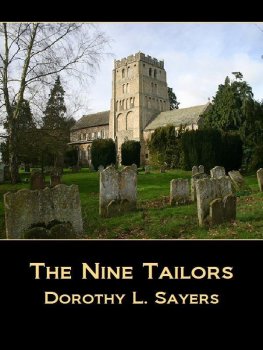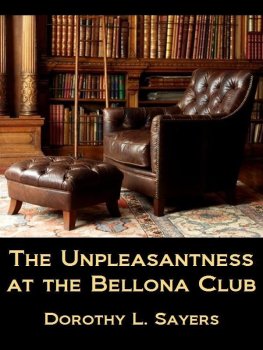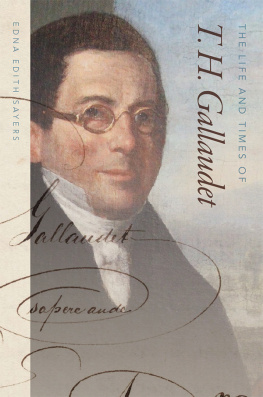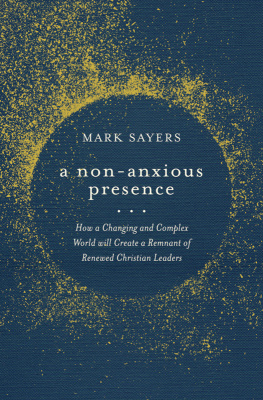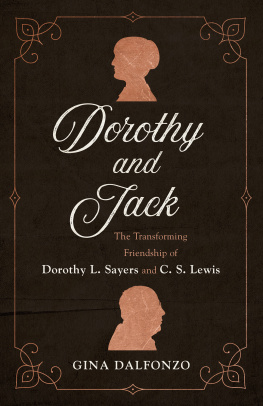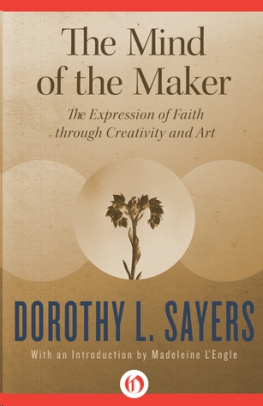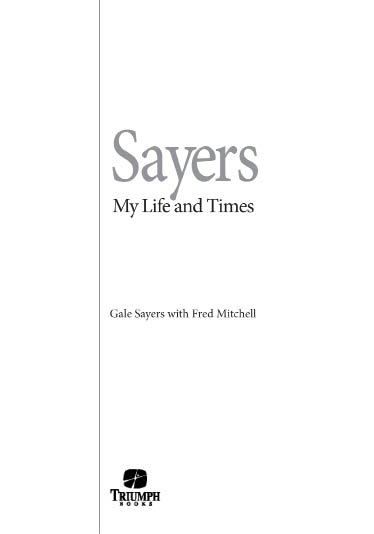Dedication
I dedicate this book to all the true pioneers of the National Football League, many of whom have gone withoutworldwide recognition over the years; players such as Fritz Pollard and Bobby Marshall, who were the first two African Americans to play in the NFL in the early 1920s.
I also dedicate this book to Buddy Young, a former great player whose sage advice guided a young Gale Sayers through a maze of life-changing decisions as I made the transition from college to professional football.
I offer special acknowledgment to all of the outstanding NFL players of the 50s and 60s who laid the foundation for the game today and made it possible for modern-day players to enjoy the millions of dollars that they do. Players such as Hugh McElhenny, Ollie Matson, Jim Brown, Deacon Jones, Merlin Olsen, Lenny Moore, Lem Barney, and many, many more.
I give special thanks and dedication to my mentor, George Halas, whose encouragement and wisdom made me a better football player and, more important, a better person.
And finally, I dedicate this book to my former teammate Brian Piccolo, who showed me the true meaning of life, love,and friendship.
Contents
Foreword
Has it really been 42 years since Gale Sayers and I joined the Chicago Bears as first-round draft picks?
Sometimes I wish I could tackle Father Time, but he is one tough opponent I have been unable to stop, or even slow down, for that matter. The events of Super Bowl XLI in Miami reminded me that it was indeed 1965 when Gale and I entered the National Football League. As the Bears and Indianapolis Colts squared off in that Super Bowl, it marked the first time in 21 years since Chicago appeared in the title game.
There was a lot of talk about the history of the Bears franchise during the week leading up to the Colts 2917 victory. And any talk about the Bears storied history has to include Sayers and the quick and amazing impact he had on the professional game.
We had several future Hall of Fame players on our Bears teams when Gale and I played, yet we were unable to win a championship. To this day, I hear about that from fans. Why didnt we win a championship? How do you answer a question like that? Gale was the best running back in the league at the time. And we had some great players on defense. We just didnt have enough to really be successful as a team. But I wouldnt trade those years playing with him.
Gale was really something to watch. I felt I could always kid around with Gale and he was cool with it. He is just a good guy. We have always had a great relationship.
Playing defense in practice against Gale, I knew what the other teams had to go through. I had never met a guy who could stop on a dime and then go full speed in the opposite direction. I just couldnt believe this guy. He was absolutely the best.
What I admired about Gale is that he did everything. He returned kickoffs, he returned punts, and, man, could he run from scrimmage. It wasnt in vogue then to be sort of a specialist. He was a tough character. It had to be equally tough for him playing against our defense as it was for me playing against our offense in practice. But all of our efforts seemed to go for naught as far as winning a championship.
I remember meeting Gale for the first time in 1965 at an All-Star Game in Buffalo. It was just prior to the old College All-Star Game in Chicago. Then there were all of the All-America events that were held in New York that year, including the Look magazine session. Back in those days, you seldom saw highlight film clips of the college players the way you do today on ESPN and all the other television networks. So in New York that year I got to see a black-and-white film clip of Gale, who was known as the Kansas Comet. I remember he was wearing high-top shoes as he returned a kickoff for a touchdown.
Then I played against him in a couple of All-Star games. Thinking back, I never faced a running back like that. He was the best. Glad we wound up being on the same team!
A lot of people do not realize how vigorously the old fledgling American Football League pursued both Gale and me in 1965. The Kansas City Chiefs also had drafted Gale that year; and the Denver Broncos selected me out of Illinois as the NFL and AFL fought for player talent.
I alsoremember that Gale and I were in New York in 1965 for the Ed Sullivan Show, and the NFL draft happened to be that Saturday. After I got back to my hotel room, there was a knock at the door. I opened the door and there was Lamar Hunt, then representing the Kansas City Chiefs. He said: Okay, now we have to try to get Gale with us.
Well, I was pretty nave back then. So I said: Yeah, okay, whatever. It took me a number of years to realize what Hunt was trying to get me to do. I figured out later that he thought the deal Denver was going to offer me was going to be so out of line and extraordinary that I would be stupid to turn it down. I guess he was under the assumption that I was going to go to Denver and that would help to get Gale to the American Football League with the Kansas City Chiefs. It was kind of weird. I always remember that.
Wouldnt that have changed sports history if Gale and I had decided to play in the AFL!
My attorney at the time was Arthur Morris, and we looked at the numbers from Denver. But we had an appointment with George Halas at the Bears office, and that was the last time I ever saw or heard from anybody from Denver. And, of course, Gale turned down an offer from Kansas City.
As remarkable as Gales Hall of Fame football career was, I am even more impressed with what he has done since he retired. I have worked hard to take advantage of some opportunities that came my way as an actor in Hollywood and on television since my playing days ended. And Gale has succeeded as a businessman, administrator,and philanthropist. His current project involving the creation of the Gale Sayers Center in Chicago to assist youngsters really intrigues me. I think it is pretty neat that Gale is opening a center for young people that will include mentoring opportunities. He has been very successful after football and he is helping a lot of people and really getting involved.
Preparing to quit is a theme Gale continually stresses to young athletes today. Success after football has a lot to do with the makeup of the person. Gale went into what he went into, and I did my thing. I thought I would always be in football, but those doors were closed to me for a while. So I had to choose other avenues. It seems like it just worked out. A lot of people say, Oh, you were lucky, but I think you have to work to make luck.
The problem with many oftodays NFL players is that with these extraordinary salaries, many guys really dont have to worry about what they are going to do afterward. But that is shortsighted. If you blow your money or someone does not represent you properly, thatcan have a big impact on your finances.
After football, it was difficult for me to find what I liked to do second best. Football was always my first love. That certainly didnt mean that I couldnt find something else. And the proof of the pudding is where I have ended up today. I guess I could have been one of those guys who didnt prepare to quit. But things happened and through hard work I found out that, hey, there are other things besides football.
So many people who are not old enough to remember seeing Gale play for the Chicago Bears know of him through the award-winning movie Brians Song . It depicts the story of the friendship between Gale and Brian Piccolo, who were the first interracial roommates in the NFL. The compelling story of their friendship still resonates nearly four decades later.


